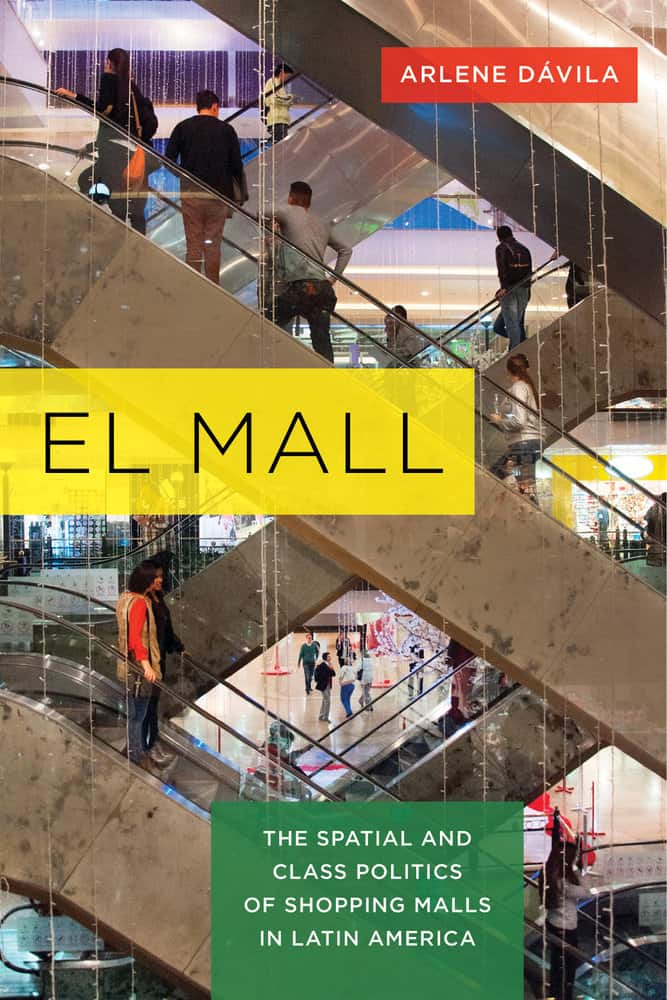by Arlene Davila, author of El Mall: The Spatial and Class Politics of Shopping Malls in Latin America
This guest post is published in conjunction with the American Anthropological Association conference in Minneapolis. Check back regularly for new posts through the end of the conference on November 20th.
UC Press is proud to be part of the AAUP’s fifth annual University Press Week. Check out our blog and social media channels through Nov. 19th (plus follow hashtags #ReadUp #UPWeek), and learn how we, along with 40 of our scholarly press colleagues, work diligently to publish vital works benefitting educational, specialized research, and general interest communities.
 Since the publication of El Mall, I have been asked what turned me to examining shopping malls and shopping cultures in Latin America, a question that is always loaded with significance. It often assumes that shopping and shopping malls are irrelevant subjects of study for anthropologists and scholars, or that consumer culture is a vain or superfluous topic, or even that Latin Americans are exempt from the dreams and pulls of global consumer culture. I end these conversations thinking that all the talk around globalization, neoliberalism, mediated lives and materiality notwithstanding anthropologists and interdisciplinary scholars have not fully come to terms with the powerful pull of consumption and consumer cultures throughout the world and with the need to fully engage these topics in our research.
Since the publication of El Mall, I have been asked what turned me to examining shopping malls and shopping cultures in Latin America, a question that is always loaded with significance. It often assumes that shopping and shopping malls are irrelevant subjects of study for anthropologists and scholars, or that consumer culture is a vain or superfluous topic, or even that Latin Americans are exempt from the dreams and pulls of global consumer culture. I end these conversations thinking that all the talk around globalization, neoliberalism, mediated lives and materiality notwithstanding anthropologists and interdisciplinary scholars have not fully come to terms with the powerful pull of consumption and consumer cultures throughout the world and with the need to fully engage these topics in our research.
In the twenty or so years that I’ve been researching and writing about consumer culture and the political economy of culture I’ve found that cultural studies on these subjects still focuses overwhelmingly on the United States and Europe, while anthropologist are still shy to take on subjects that would compromise the “authenticity” of their anthropological field sites or topics of research. Why study shopping malls, or fashion, or commercial media when these cultural phenomena seem indistinguishable from our cozy experiences in our very own consumer landscapes?-goes the thinking. The fact is that I myself was not immune to these concerns when I embarked on this study. I wrote about shopping malls not because I had purposefully set out to do so, but because I found myself in the “belly of the beast” – sharing my previous work on Puerto Rican consumer culture in a trade organization meeting of the International Council of Shopping Centers in Medellin – invited by a former interviewee. It was he who felt I needed to write about shopping mall cultures and who despite my warnings that whatever I wrote would be from a critical perspective –opened my eyes to the booming world of shopping malls developers, contractors, pundits and more. Soon I learned that this impenetrable business that seemed to materialize all the workings of neoliberal capitalism and remained so intimidating in its scope and reach was ripe for analysis.
Those of use who strive to study up and expose the political economy of institutions, industries and how capitalism works know full well that access is not always easy to get. Corporate culture is all about confidentiality agreements, closed door meetings, proprietary research, and inaccessibly priced meetings and conferences that keep many of us at bay from knocking at the doors of powerful stakeholders of capitalism. But with access comes responsibility to follow up and crack up the worlds of industry and neoliberal capitalism with fine tuned ethnographic research. The result is a book that shows the why and how shopping malls are one of the most powerful engines of social transformations in Latin America, shaping how cities are organized and even how local fashionistas define class and identities on their daily lives. Most humbly, the result is a reminder of the same lesson I learned when writing Latinos Inc. years earlier: That capitalism is made up of relationships and that studying up is more necessary than ever in these age of rapid neoliberalization. Once again, the “mundane” yet shining space of consumer culture surpassed my own expectations of what questions could be asked, and what issues were most relevant within this industry, from urban design to the topic of informal economies and even fast fashion. In all, I’m very glad I heard the call the mall, and just delved in!
When sharing on social media, please be sure to use the #AAA2016 hashtag!

